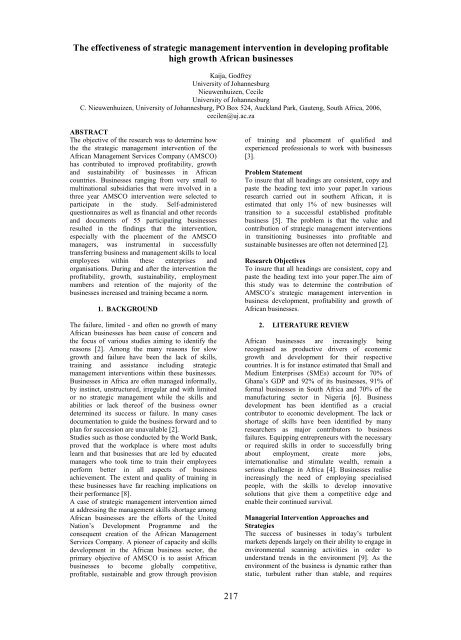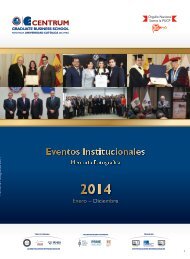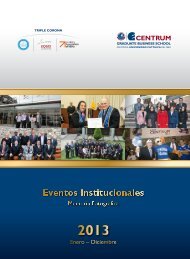Pan-Pacific Conference XXXIV. Designing New Business Models in Developing Economies
This publication represents the Proceedings of the 34th Annual Pan-Pacific Conference being held in Lima, Peru May 29-31, 2017. The Pan-Pacific Conference has served as an important forum for the exchange of ideas and information for promoting understanding and cooperation among the peoples of the world since 1984. Last year, we had a memorable conference in Miri, Malaysia, in cooperation with Curtin University Sarawak, under the theme of “Building a Smart Society through Innovation and Co-creation.” Professor Pauline Ho served as Chair of the Local Organizing Committee, with strong leadership support of Pro Vice-Chancellor Professor Jim Mienczakowski and Dean Jonathan Winterton.
This publication represents the Proceedings of the 34th Annual Pan-Pacific Conference being held in Lima, Peru May 29-31, 2017. The Pan-Pacific Conference has served as an important forum for the exchange of ideas and information for promoting understanding and cooperation among the peoples of the world since 1984. Last year, we had a memorable conference in Miri, Malaysia, in cooperation with Curtin University Sarawak, under the theme of “Building a Smart Society through Innovation and Co-creation.” Professor Pauline Ho served as Chair of the Local Organizing Committee, with strong leadership support of Pro Vice-Chancellor Professor Jim Mienczakowski and Dean Jonathan Winterton.
Create successful ePaper yourself
Turn your PDF publications into a flip-book with our unique Google optimized e-Paper software.
The effectiveness of strategic management <strong>in</strong>tervention <strong>in</strong> develop<strong>in</strong>g profitable<br />
high growth African bus<strong>in</strong>esses<br />
Kaija, Godfrey<br />
University of Johannesburg<br />
Nieuwenhuizen, Cecile<br />
University of Johannesburg<br />
C. Nieuwenhuizen, University of Johannesburg, PO Box 524, Auckland Park, Gauteng, South Africa, 2006,<br />
cecilen@uj.ac.za<br />
ABSTRACT<br />
The objective of the research was to determ<strong>in</strong>e how<br />
the the strategic management <strong>in</strong>tervention of the<br />
African Management Services Company (AMSCO)<br />
has contributed to improved profitability, growth<br />
and susta<strong>in</strong>ability of bus<strong>in</strong>esses <strong>in</strong> African<br />
countries. <strong>Bus<strong>in</strong>ess</strong>es rang<strong>in</strong>g from very small to<br />
mult<strong>in</strong>ational subsidiaries that were <strong>in</strong>volved <strong>in</strong> a<br />
three year AMSCO <strong>in</strong>tervention were selected to<br />
participate <strong>in</strong> the study. Self-adm<strong>in</strong>istered<br />
questionnaires as well as f<strong>in</strong>ancial and other records<br />
and documents of 55 participat<strong>in</strong>g bus<strong>in</strong>esses<br />
resulted <strong>in</strong> the f<strong>in</strong>d<strong>in</strong>gs that the <strong>in</strong>tervention,<br />
especially with the placement of the AMSCO<br />
managers, was <strong>in</strong>strumental <strong>in</strong> successfully<br />
transferr<strong>in</strong>g bus<strong>in</strong>ess and management skills to local<br />
employees with<strong>in</strong> these enterprises and<br />
organisations. Dur<strong>in</strong>g and after the <strong>in</strong>tervention the<br />
profitability, growth, susta<strong>in</strong>ability, employment<br />
numbers and retention of the majority of the<br />
bus<strong>in</strong>esses <strong>in</strong>creased and tra<strong>in</strong><strong>in</strong>g became a norm.<br />
1. BACKGROUND<br />
The failure, limited - and often no growth of many<br />
African bus<strong>in</strong>esses has been cause of concern and<br />
the focus of various studies aim<strong>in</strong>g to identify the<br />
reasons [2]. Among the many reasons for slow<br />
growth and failure have been the lack of skills,<br />
tra<strong>in</strong><strong>in</strong>g and assistance <strong>in</strong>clud<strong>in</strong>g strategic<br />
management <strong>in</strong>terventions with<strong>in</strong> these bus<strong>in</strong>esses.<br />
<strong>Bus<strong>in</strong>ess</strong>es <strong>in</strong> Africa are often managed <strong>in</strong>formally,<br />
by <strong>in</strong>st<strong>in</strong>ct, unstructured, irregular and with limited<br />
or no strategic management while the skills and<br />
abilities or lack thereof of the bus<strong>in</strong>ess owner<br />
determ<strong>in</strong>ed its success or failure. In many cases<br />
documentation to guide the bus<strong>in</strong>ess forward and to<br />
plan for succession are unavailable [2].<br />
Studies such as those conducted by the World Bank,<br />
proved that the workplace is where most adults<br />
learn and that bus<strong>in</strong>esses that are led by educated<br />
managers who took time to tra<strong>in</strong> their employees<br />
perform better <strong>in</strong> all aspects of bus<strong>in</strong>ess<br />
achievement. The extent and quality of tra<strong>in</strong><strong>in</strong>g <strong>in</strong><br />
these bus<strong>in</strong>esses have far reach<strong>in</strong>g implications on<br />
their performance [8].<br />
A case of strategic management <strong>in</strong>tervention aimed<br />
at address<strong>in</strong>g the management skills shortage among<br />
African bus<strong>in</strong>esses are the efforts of the United<br />
Nation’s Development Programme and the<br />
consequent creation of the African Management<br />
Services Company. A pioneer of capacity and skills<br />
development <strong>in</strong> the African bus<strong>in</strong>ess sector, the<br />
primary objective of AMSCO is to assist African<br />
bus<strong>in</strong>esses to become globally competitive,<br />
profitable, susta<strong>in</strong>able and grow through provision<br />
of tra<strong>in</strong><strong>in</strong>g and placement of qualified and<br />
experienced professionals to work with bus<strong>in</strong>esses<br />
[3].<br />
Problem Statement<br />
To <strong>in</strong>sure that all head<strong>in</strong>gs are consistent, copy and<br />
paste the head<strong>in</strong>g text <strong>in</strong>to your paper.In various<br />
research carried out <strong>in</strong> southern African, it is<br />
estimated that only 1% of new bus<strong>in</strong>esses will<br />
transition to a successful established profitable<br />
bus<strong>in</strong>ess [5]. The problem is that the value and<br />
contribution of strategic management <strong>in</strong>terventions<br />
<strong>in</strong> transition<strong>in</strong>g bus<strong>in</strong>esses <strong>in</strong>to profitable and<br />
susta<strong>in</strong>able bus<strong>in</strong>esses are often not determ<strong>in</strong>ed [2].<br />
Research Objectives<br />
To <strong>in</strong>sure that all head<strong>in</strong>gs are consistent, copy and<br />
paste the head<strong>in</strong>g text <strong>in</strong>to your paper.The aim of<br />
this study was to determ<strong>in</strong>e the contribution of<br />
AMSCO’s strategic management <strong>in</strong>tervention <strong>in</strong><br />
bus<strong>in</strong>ess development, profitability and growth of<br />
African bus<strong>in</strong>esses.<br />
2. LITERATURE REVIEW<br />
African bus<strong>in</strong>esses are <strong>in</strong>creas<strong>in</strong>gly be<strong>in</strong>g<br />
recognised as productive drivers of economic<br />
growth and development for their respective<br />
countries. It is for <strong>in</strong>stance estimated that Small and<br />
Medium Enterprises (SMEs) account for 70% of<br />
Ghana’s GDP and 92% of its bus<strong>in</strong>esses, 91% of<br />
formal bus<strong>in</strong>esses <strong>in</strong> South Africa and 70% of the<br />
manufactur<strong>in</strong>g sector <strong>in</strong> Nigeria [6]. <strong>Bus<strong>in</strong>ess</strong><br />
development has been identified as a crucial<br />
contributor to economic development. The lack or<br />
shortage of skills have been identified by many<br />
researchers as major contributors to bus<strong>in</strong>ess<br />
failures. Equipp<strong>in</strong>g entrepreneurs with the necessary<br />
or required skills <strong>in</strong> order to successfully br<strong>in</strong>g<br />
about employment, create more jobs,<br />
<strong>in</strong>ternationalise and stimulate wealth, rema<strong>in</strong> a<br />
serious challenge <strong>in</strong> Africa [4]. <strong>Bus<strong>in</strong>ess</strong>es realise<br />
<strong>in</strong>creas<strong>in</strong>gly the need of employ<strong>in</strong>g specialised<br />
people, with the skills to develop <strong>in</strong>novative<br />
solutions that give them a competitive edge and<br />
enable their cont<strong>in</strong>ued survival.<br />
Managerial Intervention Approaches and<br />
Strategies<br />
The success of bus<strong>in</strong>esses <strong>in</strong> today’s turbulent<br />
markets depends largely on their ability to engage <strong>in</strong><br />
environmental scann<strong>in</strong>g activities <strong>in</strong> order to<br />
understand trends <strong>in</strong> the environment [9]. As the<br />
environment of the bus<strong>in</strong>ess is dynamic rather than<br />
static, turbulent rather than stable, and requires<br />
217

















